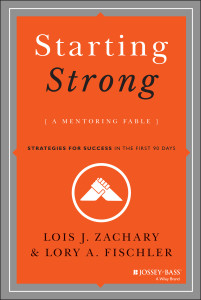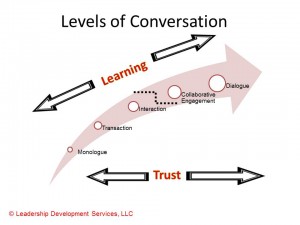
by Center for Mentoring Excellence | Apr 24, 2017 | Facilitating Learning, Goal Setting Conversation, Growth and Development, Mentoring Communication
Does this mentoring conversation sound familiar?
“When my mentee complains about her VP, I take a small breath. The normal me would start coaching, telling, suggesting, and problem solving. That’s what I am good at. But guess what? That’s not what she is looking for from me, nor does she really need it.
My mentee knows what she needs to do. What she is actually looking for is acknowledgement and support for approach and strategies. So, I’ve learned to don my facilitator hat and start the conversation by asking questions. And I listen. And I learn. I learn what she is thinking. I learn what frustrates her. I learn what she has already tried. I learn what has worked. And mostly I learn what a talented, perceptive, ambitious woman she is. I look for ways to applaud her efforts and her thinking. I hold up a mirror for her and sometimes help her tweak her idea. We both come away having learned something new, along with increased appreciation of our different points of view.”
Conversation should come easy to all of us, right? Wait. Not so fast. What often passes for conversation is sometimes something quite different: information sharing, transactions, question and answer, and even push-back.
Really good mentoring conversation is more about exploring and sharing, rather than telling and reporting. It’s about going deeper, not staying broad and skimming the surface. Good mentoring conversation connects us to one another.
Conversation matters because there is a lot at stake. At the Center for Mentoring Excellence we set high standards for mentoring conversations. We believe really good mentoring depends on a continuum of meaningful conversation. Mentoring partners engage in conversation to grow their relationship, identify learning goals, and work on mentee growth and development. So, you see, there is a lot riding on what you do.
Takeaway: Be brave enough to start a conversation that matters — because it does!

by Center for Mentoring Excellence | Jan 5, 2016 | Making Mentoring Work For You
 Starting Strong: A Mentoring Fable provides a view inside six successful mentoring conversations that take place over 90 days. The reader is privy to the thoughts and reflections of both the mentor and mentee, and gets to observe the personal dynamics of a successful mentoring relationship as it unfolds. It’s an excellent training resource because it models how good mentoring should look and feel.
Starting Strong: A Mentoring Fable provides a view inside six successful mentoring conversations that take place over 90 days. The reader is privy to the thoughts and reflections of both the mentor and mentee, and gets to observe the personal dynamics of a successful mentoring relationship as it unfolds. It’s an excellent training resource because it models how good mentoring should look and feel.
Cynthia is one of the mentors you meet in the book. She is an experienced mentor who is committed to her own growth and development as a mentor and the growth and development her mentees.
The story of Cynthia and her Gen-Y mentee unfolds over 90 days (six mentoring meetings) and you get to sit in on each of them. You will hear their private thoughts before, during and after their meetings. At the end of each chapter, you will find questions to prompt personal reflection and spark conversation about the chapter content.
Cynthia learned the hard way about how to create a successful mentoring partnership. After a few failed mentoring relationships of her own, she grew from the experience. By the time she launched her next relationship, she was savvier and had a clearer understanding of what it takes to achieve tangible results.
What made the difference for Cynthia? What did she do differently that made her more successful?
In Starting Strong, you will learn about Cynthia’s strategies for mentoring success:
1. Cynthia recognizes that her mentee will be uneasy as the more junior employee, mentored by a senior executive. She takes time to get to know him and put him at ease before launching into the work of mentoring.
2. Some key structures and agreements help set the tone and expectations for progress and accountability. The mentee, who is new to mentoring, thought mentoring was an informal drop-in relationship.
3. Learning is the purpose and product of mentoring — and its goals drive the learning. Mentors and mentees alike struggle with goal setting. It can be tempting for mentees to pick goals they can easy achieve or that aren’t relevant to their work success.
4. Application of skills and learning are a critical part of mentee success.
5. Stumbling blocks are inevitable in mentoring relationships. Mentors and mentees need a confidential, safe place to get coaching around issues that surface.
6. The 90 day mark is an excellent time to schedule a check-in with mentoring partners.
The conversation playbook guides you so that you can engage in parallel conversation with Cynthia and her mentee. It prepares you for your mentoring sessions by suggesting appropriate conversation topics, starters and probing questions to use to build a solid foundation for your own mentoring relationships during the first 90 days.

by Center for Mentoring Excellence | Jul 29, 2012 | Growth and Development
Can you recall the last time when you were engaged openly and respectfully in two-way, free-flowing really great and meaningful conversation? If you are like most people you can probably recall one or two such occasions even though you may be engaging in real conversation less and less these days.
It is ironic that in the very process of connecting with each other, we are actually becoming more and more disconnected. Technology has made connecting more expedient but, at the same time, it has affected how we interact and engage with each other.
Mentoring relationships run the risk of becoming a series of sound bites (text and IM) instead of real conversations. Engaging in conversation increases trust and facilitates learning in a mentoring relationship.
We developed the Levels of Conversation model to illustrate how trust and learning expand relative to the level of conversation that takes place in a mentoring relationship.
Monologue is essentially a non-conversation. It shuts down, rather than invites, conversation. It doesn’t build trust or promote learning. One or the other party claims all the airspace for storytelling, lecturing or expounding.
Most people engage in transaction when they mean to be in conversation. The conversation goes back and forth and remains on the surface. I.e., “Would you do me a favor? Yes. Did you read that article? Good.”
Interactions are useful information exchanges and approximate conversation but still skim the surface. Your mentee asks you how to get something done and you respond by suggesting different ways to get the job done.
Good conversation lives above the dotted line. With the move to collaborative engagement the quality of the interaction shifts. This is where deeper insight and reflection take place. There is more trust and therefore mentor and mentee are both willing to be vulnerable. The conversation and relationship deepen and learning accelerates to a new level.
When conversation becomes dialogue, shared understanding emerges from the mutual learning that is taking place. Because trust is high there is no defensiveness. Conversation is open. As different perspectives emerge, the thinking of mentor and mentee expand.
The further along the continuum you are the more trusting your relationship becomes and the more learning takes place.
 Leadership Questions: Good conversation is the key to building trust and facilitating learning in a mentoring relationship. Where are you and your mentee spending most of your time along this continuum? What do you need to do more of? What do you need to do less of?
Leadership Questions: Good conversation is the key to building trust and facilitating learning in a mentoring relationship. Where are you and your mentee spending most of your time along this continuum? What do you need to do more of? What do you need to do less of?
This just might be the time to have a conversation about conversation and find out!
by Center for Mentoring Excellence | Jul 23, 2012 | Uncategorized
1. Coming to meetings unprepared. Mentoring-on-the-run doesn’t work. It isn’t “an activity” to squeeze in on an already overcrowded calendar. To stay focused and on track you will need to make time to prepare for each and every mentoring meeting. (more…)



 Starting Strong: A Mentoring Fable provides a view inside six successful mentoring conversations that take place over 90 days. The reader is privy to the thoughts and reflections of both the mentor and mentee, and gets to observe the personal dynamics of a successful mentoring relationship as it unfolds. It’s an excellent training resource because it models how good mentoring should look and feel.
Starting Strong: A Mentoring Fable provides a view inside six successful mentoring conversations that take place over 90 days. The reader is privy to the thoughts and reflections of both the mentor and mentee, and gets to observe the personal dynamics of a successful mentoring relationship as it unfolds. It’s an excellent training resource because it models how good mentoring should look and feel.



